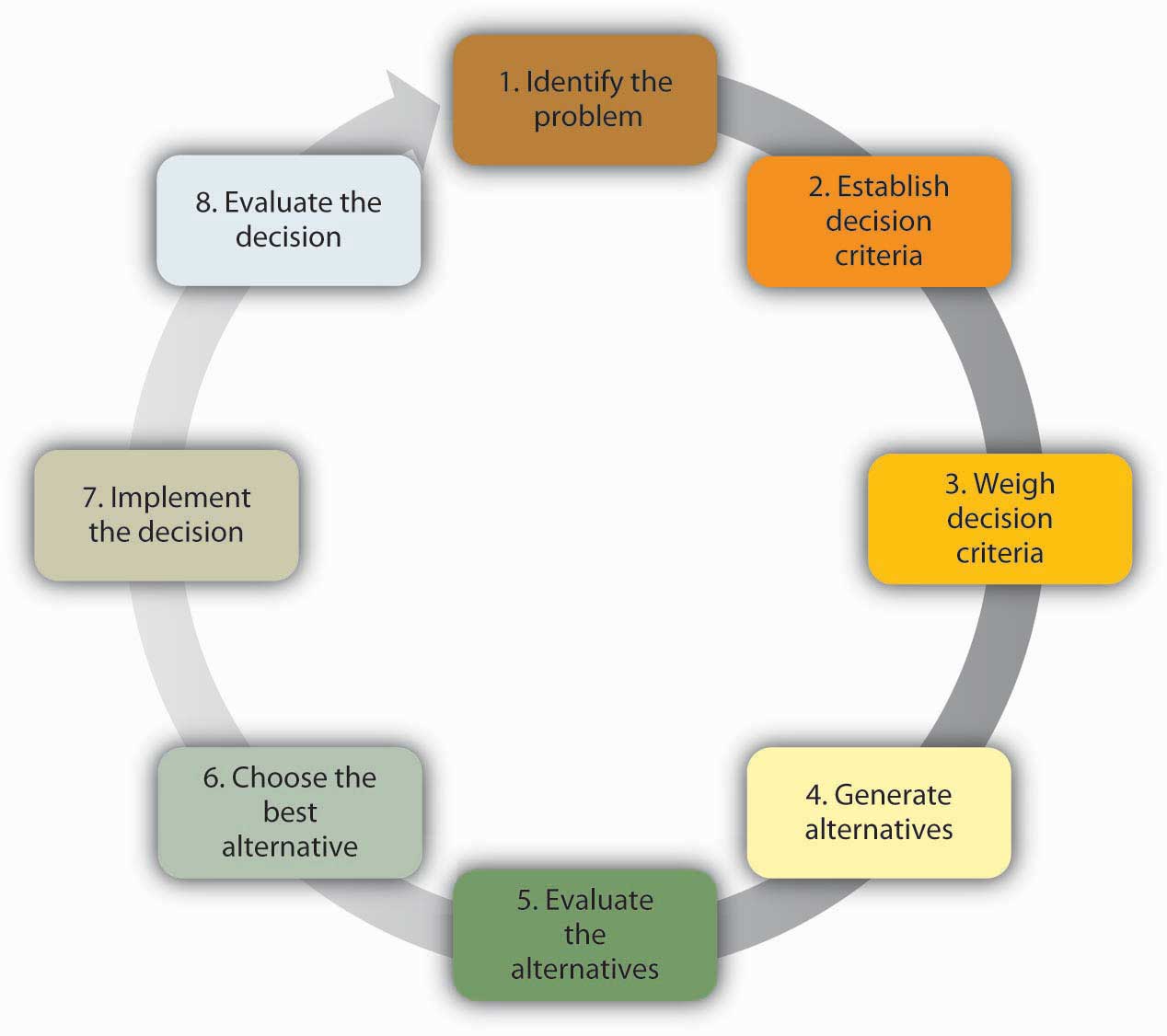7.5 Self-exploration – Values and Decision Making

When your values are clear to you, making decisions becomes easier. -Roy Disney
Learning Objectives
By the end of this chapter, you will be able to:
-
- Define your work values.
- Learn steps to a rational decision-making model.
- Understand how making decisions based on values can lead to career satisfaction.
Values
An essential part of the self-discovery journey of your career exploration process is identifying what is most important to you–your values–and learn how they influence and motivate your goals. Values drive our actions and they motivate our goals. Your goals help you establish your priorities in life, guide your decision-making, and affect your evaluation of your success and happiness in life. Take time to reflect on what being successful means to you. It will be different for you than for other people. Think of your values as you are thinking about becoming successful.
As defined at CareerOneStop, a source for employment information sponsored by the US Department of Labor:
-
-
- Values are your beliefs about what is important or desirable.
- When your values line up with how you live and work, you tend to feel more satisfied and confident.
- Living or working in ways that contradict your values can lead to dissatisfaction, confusion, and discouragement. So there is good reason to clarify your values, and seek to match your work to them.
-
Identify Your Work Values
Watch the following video of the US First Lady Michelle Obama speaking to an audience of students and reminds each one to take their education seriously — and never take it for granted. Listen as she references the value of education throughout this video.
Activity
Complete the following three activities offered by CareerOneStop to review your work values:
- Read about six core work values developed by the U.S. Department of Labor’s O*NET program. Click on the ones that best describe you to see careers that highlight that value.
- Do it yourself: download and print O*NET’s work values cards (pdf). Cut your own cards and sort them into three piles, identifying whether each is “essential,” “important,” or “not important” for your career needs.
- Take this online assessment to learn more about your own work values and related careers. This interactive assessment was developed by Virginia’s Community Colleges.
After you have identified your top values, explore careers that would allow you to express your values from the following two online resources: (I) O*NET Online and (II) California Career Zone:
I. U.S. Department of Labor’s O*NET Online:
O*NET OnLine is an application that was created for the general public to provide broad access to the O*NET database of occupational information. O*NET OnLine offers a variety of search options and occupational data. Go to O*NET OnLine to review the six core work values or global aspects of work that are important to a person’s satisfaction. The 6 work values are achievement, independence, recognition, relationships, support, and working conditions as you have read from Activity 3.1. Click on the ones that best describe you to see careers that highlight that value.
II. California Career Zone
Complete the Work Interest Profiler on CA Career Zone. Based on your results, you will discover how much you value achievement, independence, recognition, relationships, support, and working conditions. These are the same 6 work values listed above because it provides career exploration and planning, especially for students, from the wealth of information on 900 occupations from the O*Net database.
Making Decisions Based on Values
Decision-making refers to making choices among alternative courses of action—which may also include inaction. Not all decisions in life have major consequences or even require a lot of thought. For example, before you come to class, you make simple and habitual decisions such as what to wear, what to eat, and which route to take as you go to and from home and school. You probably do not spend much time on these mundane decisions. However, decisions that are unique and important require conscious thinking, information gathering, and careful consideration of alternatives. In this case, making a decision about your future career is an important one that requires a thoughtful review of what you consider most important in life, your values. Increasing effectiveness in decision-making is an important part of maximizing your effectiveness at work.
How do you normally make important decisions? Toss a coin? Take advice from trusted role models? Or let fate decide for you? It is important to be self-aware, especially when it comes to making difficult and important life decisions. We will examine here the rational decision-making model which includes a series of steps that decision-makers should consider to make the best choice.
Let’s imagine that your old, clunky car has broken down, and you have enough money saved for a substantial down payment on a new car. It will be the first major purchase of your life, and you want to make the right choice. The first step, therefore, has already been completed—we know that you want to buy a new car.
Next, in step 2, you’ll need to decide which factors are important to you. How many passengers do you want to accommodate? How important is fuel economy to you? Is safety a major concern? You only have a certain amount of money saved, and you don’t want to take on too much debt, so price range is an important factor as well. If you know you want to have room for at least five adults, get at least twenty miles per gallon, drive a car with a strong safety rating, not spend more than $22,000 on the purchase, and like how it looks, you have identified the decision criteria which is a set of parameters against which all of the potential options in decision making will be evaluated. All the potential options for purchasing your car will be evaluated against these criteria.
Before we can move too much further, you need to decide how important each factor is to your decision in step 3. If each is equally important, then there is no need to weigh them, but if you know that price and mpg are key factors, you might weigh them heavily and keep the other criteria with medium importance.
Step 4 requires you to generate all alternatives –all possible solutions to a problem in a decision-making process. Then, in step 5, you need to use this information to evaluate each alternative against the criteria you have established. You choose the best alternative (step 6), and then you would go out and buy your new car (step 7).
Of course, the outcome of this decision will influence the next decision made. That is where step 8 comes in. For example, if you purchase a car and have nothing but problems with it, you will be less likely to consider the same make and model when purchasing a car the next time.

- First, when making a decision, you may want to make sure that you establish your decision criteria before you search for alternatives. This would prevent you from liking one option too much and setting your criteria accordingly. For example, let’s say you started browsing cars online before you generated your decision criteria. You may come across a car that you feel reflects your sense of style and you develop an emotional bond with the car. Then, because of your love for the particular car, you may say to yourself that the fuel economy of the car and the innovative braking system are the most important criteria. After purchasing it, you may realize that the car is too small for your friends to ride in the back seat, which was something you should have thought about. Setting criteria before you search for alternatives may prevent you from making such mistakes. Another advantage of the rational model is that it urges decision-makers to generate all alternatives instead of only a few. By generating a large number of alternatives that cover a wide range of possibilities, you are unlikely to make a more effective decision that does not require sacrificing one criterion for the sake of another.
- Second, despite all its benefits, you may have noticed that this decision-making model involves a number of unrealistic assumptions as well. It assumes that people completely understand the decision to be made, that they know all their available choices, that they have no perceptual biases, and that they want to make optimal decisions.
- Additionally, while decision-makers can get off track during any of these steps, research shows that searching for alternatives in the fourth step can be the most challenging. Think about how you make important decisions in your life. It is likely that you rarely sit down and complete all eight of the steps in the rational decision-making model. For example, this model proposed that we should search for all possible alternatives before making a decision, but that process is time-consuming, and individuals are often under time pressure to make decisions. Moreover, even if we had access to all the information that was available, it could be challenging to compare the pros and cons of each alternative and rank them according to our preferences.
Learning from these important lessons, you can use the work values you identified from Activity 3.1 as your criteria in your career exploration. This will help you focus on what is most important to you so that you can choose a career that will help you feel fulfilled and satisfied. Once you decide on a career, your decision will help guide the goals you set for yourself from your college education to your future career. For help to stay on track in this journey, you can seek assistance from the information and resources you learn in this class as well as counselors and career staff at the college to guide your search. To get started in practicing your decision-making skill, you can try this next activity from California Career Café, a virtual career center for California community college students.
Key Takeaways
-
-
- First, identify your values, what you find most important and essential in life.
- Second, use your values to guide your decision-making in your education and career options.
- Finally, practice a decision-making process that provides you the opportunity to discover all of your choices so that you can make the best decisions based on all the options you have.
-
- Michelle Obama: A Passionate, Personal Case for Education. Provided by: TED. Located at: https://www.ted.com/talks/michelle_obama. License: CC BY-NC-ND: Attribution-NonCommercial-NoDerivatives
- Understanding Decision Making. Located at: https://open.lib.umn.edu/principlesmanagement/chapter/11-3-understanding-decision-making/. License: CC BY-NC-SA: Attribution-NonCommercial-ShareAlike
- ONET Online. Located at: https://www.onetonline.org/. License: All Rights Reserved
- California CareerZone . Located at: https://www.cacareerzone.org/index. License: All Rights Reserved
- Provided by: Career OneStop. Located at: https://www.careeronestop.org/. License: Public Domain: No Known Copyright
- Decisions. Authored by: CA Career Cafe. Located at: http://www.cacareercafe.com/start/decisions/. License: Public Domain: No Known Copyright
Source: Lumen Learning Career/Life Planning and Personal Exploration CC-BY

